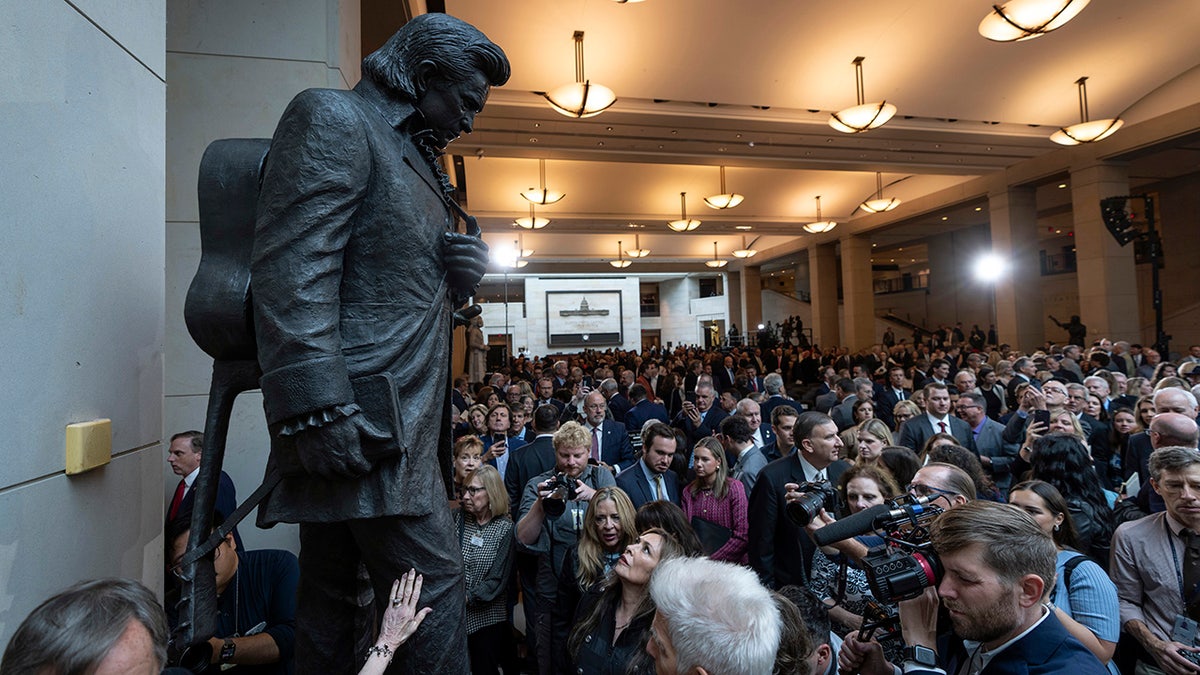Country music icon, Johnny Cash, was honored with a statue inside the United States Capitol.
The statue is one of two new monuments added to the National Statuary Hall Collection to represent the state of Arkansas in the Capitol. Each state is allowed two statues in the Capitol of notable individuals who represent their state best.
Members of the Cash family, including his sister, Joanne Cash, and his daughter, Rosanne Cash, were present when the statue was unveiled on Tuesday morning, as well as Speaker Mike Johnson, R-La., House Minority Leader Hakeem Jeffries, D-N.Y., Arkansas’ congressional delegation and Gov. Sarah Huckabee Sanders.
“I am very careful not to put words in his mouth since his passing,” Rosanne said during a speech at the unveiling ceremony. “But on this day I can safely say that he would feel that of all the many honors and accolades he received in his lifetime, this is the ultimate.”

Johnny Cash was honored with a statue in the U.S. Capitol. (Ben Curtis | Beth Gwinn/Redferns)
The statue, created by Little Rock sculptor Kevin Kresse, depicts the “Man In Black” looking down with a Bible in his right hand and with a guitar slung across his back. The base of the statue features his name, along with the year he was born and the year he died, along with the words “Singer, Songwriter, Artist, Humanitarian,” with different quotes on either side.
During the unveiling of the statue, the U.S. Air Force Band performed one of Johnny’s biggest hits, “I Walk the Line,” which was inducted into the Grammy Hall of Fame in 1998, has a permanent exhibit at the Rock and Roll Hall of Fame, and was ranked No. 3 on Rolling Stone’s 2004 list of 500 Greatest Songs of All Time.
“I am very careful not to put words in his mouth since his passing, but on this day I can safely say that he would feel that of all the many honors and accolades he received in his lifetime, this is the ultimate.”
Johnny’s statue is joined by the statue of civil rights leader, Daisy Bates, who acted as a mentor to the nine children who desegregated Little Rock Central High School in 1957. They replaced the statues of Sen. James P. Clarke and the lawyer Uriah Rose.
This marks the first time in history a musician was recognized with a statue in the National Statuary Hall Collection.


The statue depicts Cash holding a Bible, with his guitar slung across his back. (Ben Curtis)
LIKE WHAT YOU’RE READING? CLICK HERE FOR MORE ENTERTAINMENT NEWS
The Arkansas state legislature voted in 2019 to replace its two statues, which had been standing in the Capitol for over 100 years. Many different historical figures were considered, including Walmart founder Sam Walton and a Navy SEAL from the state who was killed in Afghanistan, before they decided upon Johnny and Bates.
Johnny was born in the small town of Kingston, Arkansas, around 60 miles outside of Little Rock, in the middle of the Great Depression. After serving in the Air Force, the singer tried many different careers before breaking into the music industry in 1955 when he signed with Sun Records.
Over the years, he would go on to sell 90 million records, win 13 Grammy Awards and become one of the few artists in history to be inducted in both the Country Music Hall of Fame and the Rock & Roll Hall of Fame.
The 2005 movie “Walk the Line,” starring Joaquin Phoenix as Johnny and Reese Witherspoon as his wife and fellow country singer, June Carter Cash, told the story of the singer’s difficult journey from childhood to music icon, and the struggles he faced with drug addiction. He died in September 2003 at the age of 71, from complications associated with diabetes.
CLICK HERE TO SIGN UP FOR THE ENTERTAINMENT NEWSLETTER


Rosanne explained her dad used his struggles to make great art. (Rick Diamond/Getty Images)
“In some ways he felt imprisoned by his own addictions, woundedness, and suffering, and a lot of that went into his music,” Rosanne told Music Mecca about her father’s struggles in September 2022. “That’s the gift of a great artist, is taking that suffering and making great art out of it, which he was fortunate enough to do.”
The Associated Press contributed to this report
CLICK HERE TO GET THE FOX NEWS APP















